 Convert, it's urgent! “I don't get tired as long as I have life, as long as Christ keeps me alive, I will shout, I will always shout: Brothers, please convert! Brothers, please convert, it's urgent! Don't waste time, it's urgent! Because many are waiting for great events little by little. No! The great events are going to happen in a short period, of days! All of them! And the Warning will come! [...] Let's trust in the word of Christ, and let's ask the Holy Spirit for discernment so as not to make wrong decisions" –Luz de Maria.
Convert, it's urgent! “I don't get tired as long as I have life, as long as Christ keeps me alive, I will shout, I will always shout: Brothers, please convert! Brothers, please convert, it's urgent! Don't waste time, it's urgent! Because many are waiting for great events little by little. No! The great events are going to happen in a short period, of days! All of them! And the Warning will come! [...] Let's trust in the word of Christ, and let's ask the Holy Spirit for discernment so as not to make wrong decisions" –Luz de Maria.From a testimony of Sister Mary Wilhelmina Lancaster, the Sister who founded a new Religious Order, to save Catholic Tradition and defend “the Holy Mass in Latin”.
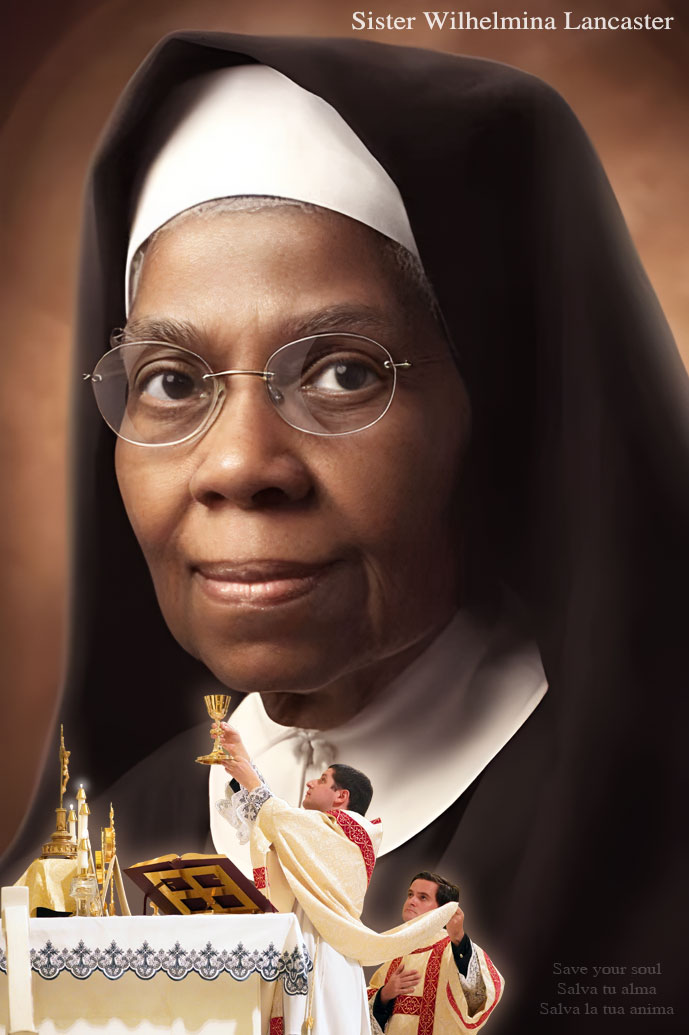
Sister Wilhelmina Lancaster writes:
«I have finally opened my eyes!
I am determined to return to the Traditional Latin Mass so that I can pray to God without distractions.
In times past, before the Novus Ordo, my eyes were always wide open, focused on observing the mysterious and fascinating actions of the Priest on the Holy Altar.
With the Novus Ordo, on the other hand, I find myself sometimes forced to close my eyes, so as not to see what the Celebrant is doing.
My neighbor once seemed as focused on the Altar as I am; now he seems more interested in something else, distracted by those around him.
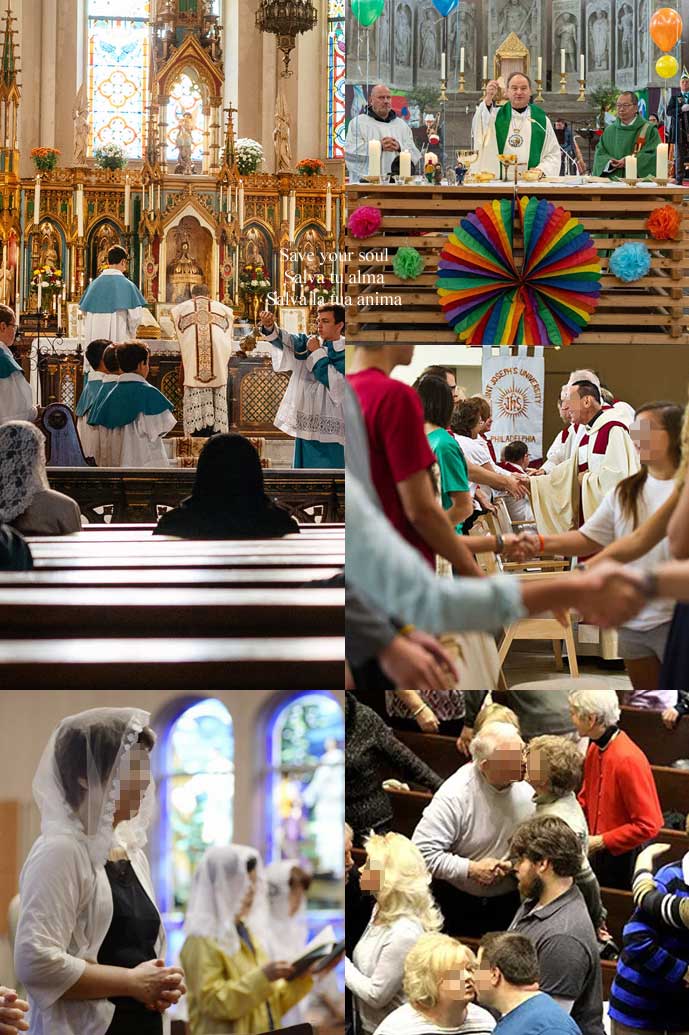
I have never tolerated the handshakes, hugs and even kisses that take place just before Holy Communion, which distract from the “sacredness of the moment”.
For justice, charity and respect, there should be, in all Masses of the Novus Ordo, an area reserved for those who do not wish to exchange greetings and embraces during the Eucharistic Celebration.
Those who want to kiss and embrace their neighbors should stay out of it, without disturbing the others, in a moment of maximum concentration to go and receive Our Lord.
Don’t get me wrong; I’ve always been an advocate of active participation in Holy Mass.
For years, before Vatican II, I did my best to promote the “Recited Mass”, but I also always appreciated the fact that the Holy Mass is a public and liturgical prayer, different from private and personal prayer.
In private prayer, at any time, any personal word, book, or posture may be used, for there are no rules, much less specific headings.
In the Holy Mass, however, everything is prescribed, because the Liturgy is the Prayer not only of the local Community, but of the entire Holy Church, Catholic, Apostolic, Roman, of the entire Mystical Body of Christ.
That is why, for the Liturgy, the question of “approved texts” is fundamental.
The liturgical norms allow and even encourage the Priest to vary, in the context of the Holy Mass, the words of the greetings, to give explanations at certain moments, with Warnings and more, sometimes personalizing the whole, even if the content of the Prayers, the Readings and, above all, the Eucharistic Prayers must be only that of the approved Texts.
Frankly, I’m tired and sorry for all the improvisations that happen in the Holy Mass today.
In my opinion, the worst confusion since the promulgation of the Novus Ordo has resulted precisely from this personalization, or replacement of personal prayer in the Liturgy, which has literally alienated some people from the Assembly.
Now, as if that were not enough, there is a campaign underway to change the existing “English translations” of both the Novus Ordo Mass and the Liturgy of the Hours, reportedly “to make them more inclusive of women”.
What nonsense!
Who does not have enough understanding of our language, to understand that women have always been included in different terms, in the essence of their “humanity”, which should not correct the tasks of the third grade, let alone the “language of the Liturgy”.
That’s enough! Enough of these improvised musicians, these illiterate reviewers, these tireless reformers, these “liturgical lobbyists”, who treat the Holy Mass as if it were their “personal instrument of propaganda”.
Finally, I return to the tried and true, the fixed and immutable: the Traditional Latin Holy Mass.»
****
Short Bio of Sister Mary Wilhelmina Lancaster
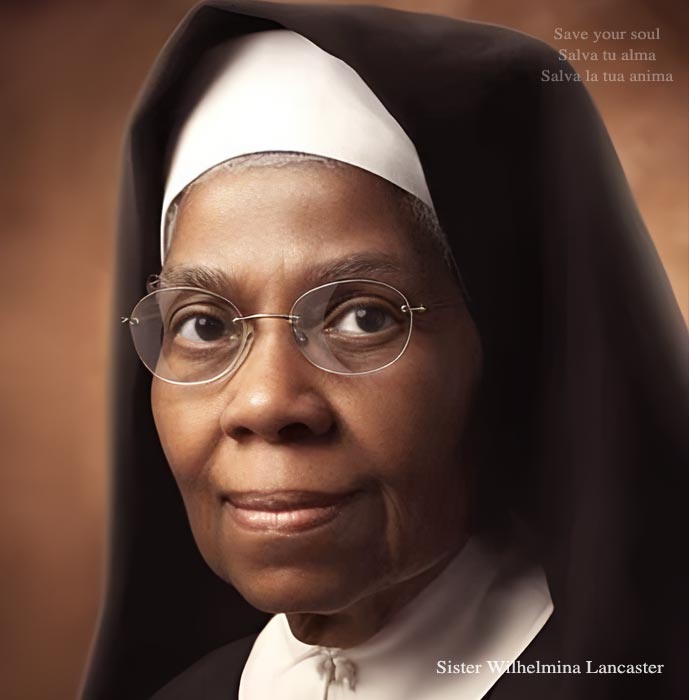
Sister Mary Wilhelmina is known for her devotion and love of the Traditional Latin Mass.
Mary Wilhelmina Lancaster, (born Elisabeth Lancaster, later taking the religious name Mary Wilhelmina of the Most Holy Rosary; April 13, 1924 – May 29, 2019), was a nun from rural Missouri who founded the Benedictines of Mary, Queen of Apostles.
Her remains were discovered as incorrupt in May 2023. She was previously a member of the Oblate Sisters of Providence.
Mary Wilhelmina was born Mary Elizabeth Lancaster on April 13, 1924 in St. Louis, Missouri. She joined the Oblate Sisters of Providence, a congregation of black religious sisters in Baltimore, Maryland, when she was 17 years old and adopted the name Wilhelmina. After joining the congregation, Sister Wilhelmina was a schoolteacher in the eastern United States for over 50 years.
In 1995, at the age of 70, disturbed by what she saw as the modernistic loosening of standards and lax observance of the Rule of the Oblate Sisters of Providence, she left and founded the Benedictines of Mary, Queen of Apostles in Scranton, Pennsylvania.
In 2005, the sisters’ community, which attends the Tridentine Mass in Ecclesiastical Latin liturgical language and prays using the 1962 monastic breviary, moved to Gower, Missouri. Sister Wilhelmina died in Gower on May 29, 2019. (Wikipedia)
In memory of Suor Mary Wilhelmina Lancaster (PDF) : learn more…
Source: The Remnant



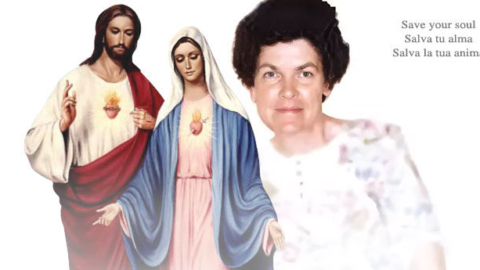







 "If you knew how you shine after duly approaching the Sacrament of Confession. "Jesus is in the Confessional and He hears every word, sees into every corner of your heart and Is eager to bestow the graces inherent in His Forgiveness.
"If you knew how you shine after duly approaching the Sacrament of Confession. "Jesus is in the Confessional and He hears every word, sees into every corner of your heart and Is eager to bestow the graces inherent in His Forgiveness.
 "I ask to end to this abomination! No more of extraordinary Ministers of the Eucharist, no more of Communions in the hand!"
"I ask to end to this abomination! No more of extraordinary Ministers of the Eucharist, no more of Communions in the hand!"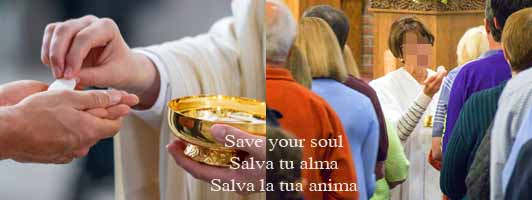




 "Heavenly Father, today, I surrender to You my heart. Help me to be Your instrument in the world. Cover me with the Precious Blood of Your Divine Son. Guard me against all evil. Protect me from any evil plan Satan may have for me today. Clothe me in Your Divine Will. Amen"
"Heavenly Father, today, I surrender to You my heart. Help me to be Your instrument in the world. Cover me with the Precious Blood of Your Divine Son. Guard me against all evil. Protect me from any evil plan Satan may have for me today. Clothe me in Your Divine Will. Amen" "Oh Jesus of Divine Mercy, hear my pleadings to you, for I am here to do your Will!"
"Oh Jesus of Divine Mercy, hear my pleadings to you, for I am here to do your Will!"
 "I place myself in the presence of the Most Holy Trinity (Father, Son, and Holy Spirit) and by the power of the Blood of Our Lord Jesus Christ, I break, undo, trample, annihilate, render ineffective, and erase from my physical, psychic, biological, and spiritual being every curse that has been placed on me, on my family and family tree, on any person, family member, or ancestor through acts of occultism or spiritism. By the power of the Precious Blood of Our Lord Jesus Christ and through the intercession of the Blessed Virgin Mary, St. Michael, St. Gabriel, and St. Raphael, I break and render ineffective every curse, whatever its nature, in the Name of our Lord Jesus Christ. Amen (Repeat the prayer 3 times)"
"I place myself in the presence of the Most Holy Trinity (Father, Son, and Holy Spirit) and by the power of the Blood of Our Lord Jesus Christ, I break, undo, trample, annihilate, render ineffective, and erase from my physical, psychic, biological, and spiritual being every curse that has been placed on me, on my family and family tree, on any person, family member, or ancestor through acts of occultism or spiritism. By the power of the Precious Blood of Our Lord Jesus Christ and through the intercession of the Blessed Virgin Mary, St. Michael, St. Gabriel, and St. Raphael, I break and render ineffective every curse, whatever its nature, in the Name of our Lord Jesus Christ. Amen (Repeat the prayer 3 times)"  "O glorious St. Joseph! by your profound humility, by your unalterable meekness, by your invincible patience, by your angelic purity and perfect fidelity that made you a timely imitator of the virtues of Jesus and Mary, I ask you to console me in all my sorrows, to guide me in all my doubts, to defend me in all temptations, to deliver me from all spiritual and material dangers; to extend your arm against all my visible and invisible enemies, breaking and destroying all the snares and barriers that they tend and arm against me. Amen."
"O glorious St. Joseph! by your profound humility, by your unalterable meekness, by your invincible patience, by your angelic purity and perfect fidelity that made you a timely imitator of the virtues of Jesus and Mary, I ask you to console me in all my sorrows, to guide me in all my doubts, to defend me in all temptations, to deliver me from all spiritual and material dangers; to extend your arm against all my visible and invisible enemies, breaking and destroying all the snares and barriers that they tend and arm against me. Amen."  "Oh, blessed Saint Michael, protect us from the attacks and snares of the evil spirits because you know full well that we are poor mortals, fragile and weak, in need of the Mercy of God and of your protection to fulfill the mission that Heaven has commissioned to us. Oh, Saint Michael, may your victorious cry: “who is like God? no one is like God”, suppress and cast into Hell satan and all the evil spirits who prowl about the world seeking the destruction of souls. Amen"
"Oh, blessed Saint Michael, protect us from the attacks and snares of the evil spirits because you know full well that we are poor mortals, fragile and weak, in need of the Mercy of God and of your protection to fulfill the mission that Heaven has commissioned to us. Oh, Saint Michael, may your victorious cry: “who is like God? no one is like God”, suppress and cast into Hell satan and all the evil spirits who prowl about the world seeking the destruction of souls. Amen" Come, Holy Spirit, send to us from Heaven a ray of your light. Come, Father of the poor, come, giver of gifts, come, light of hearts. Perfect comforter, sweet guest of the soul, sweetest relief. In toil, rest, in heat, shelter, in weeping comfort. O most blessed light, invade into the depths the hearts of your faithful. Without your strength nothing is in man, nothing is without fault. Wash what is sordid, bathe what is parched, heal what bleeds. Bend that which is stiff, warm that which is icy, straighten that which is astray. Give to your faithful who trust in you alone your Holy Gifts. Give virtue and reward, give holy death, give eternal joy. Amen.
Come, Holy Spirit, send to us from Heaven a ray of your light. Come, Father of the poor, come, giver of gifts, come, light of hearts. Perfect comforter, sweet guest of the soul, sweetest relief. In toil, rest, in heat, shelter, in weeping comfort. O most blessed light, invade into the depths the hearts of your faithful. Without your strength nothing is in man, nothing is without fault. Wash what is sordid, bathe what is parched, heal what bleeds. Bend that which is stiff, warm that which is icy, straighten that which is astray. Give to your faithful who trust in you alone your Holy Gifts. Give virtue and reward, give holy death, give eternal joy. Amen.


 "O Hearts of Jesus and Mary; I consecrate myself, I consecrate my family and the whole world, to your Most Beloved Hearts. Listen to the supplication which I making to you and accept our hearts in Yours, to be delivered and protected we, the whole world, from all evil and all sin. May the protection of your Two Hearts be refuge, strength, and protection, in the daily spiritual struggles. That the power of your Two Hearts irradiates the world so that it is protected from evil and sin. We willingly consecrate ourselves and consecrate all mankind to your Hearts; sure and confident, for your Great Mercy, to obtain the victory over the forces of evil in this world, and the eternal Glory in the Kingdom of God. Amen"
"O Hearts of Jesus and Mary; I consecrate myself, I consecrate my family and the whole world, to your Most Beloved Hearts. Listen to the supplication which I making to you and accept our hearts in Yours, to be delivered and protected we, the whole world, from all evil and all sin. May the protection of your Two Hearts be refuge, strength, and protection, in the daily spiritual struggles. That the power of your Two Hearts irradiates the world so that it is protected from evil and sin. We willingly consecrate ourselves and consecrate all mankind to your Hearts; sure and confident, for your Great Mercy, to obtain the victory over the forces of evil in this world, and the eternal Glory in the Kingdom of God. Amen"